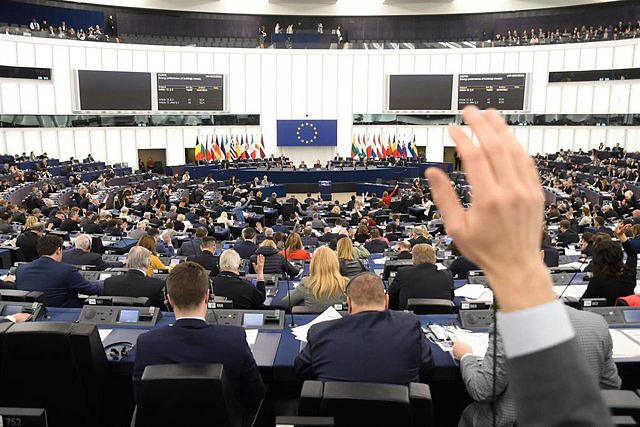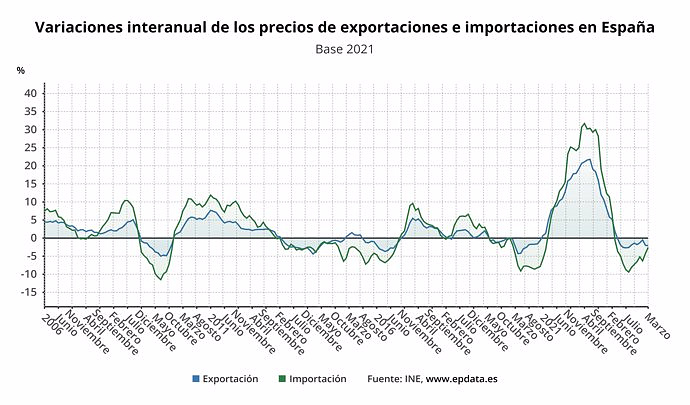The European Parliament will vote in committee at the end of this month of June on a directive on violence against women with which it will mandate the member states to establish maximum sentences for crimes of rape of no less than 8 years, with the aim of avoiding consequences such as those registered in Spain with the Law of 'only yes is yes'.
This text proposed by the European Commission, which will be discussed in committee on June 26 and 27, has received more than 1,800 amendments and aims to address violence against women, classify new eurocrimes in this regard and for countries to take steps forward in relation to the Istanbul Convention and also implement effective legislative instruments in the field of prevention, protection and assistance to victims.
But among its most outstanding measures is the obligation that the maximum penalty be imposed for "non-consensual acts of vaginal, anal or oral penetration of a sexual nature, with any part of the body or object" or before "causing a woman to participate with another person". in the aforementioned acts, is less than eight years old.
In addition, in the event that there are aggravating circumstances, the maximum penalty may not be less than 10 years. The prescription of these crimes is also included, which will have to be a minimum of 20 years from the moment the act was committed.
In this sense, the directive includes as a basis the definition of consent in the Istanbul Convention. In this text, ratified by Spain in 2009 and by the EU last May, it is stated that "consent must be given voluntarily as a manifestation of the free will of the person considered in the context of the surrounding conditions".
The PP MEP, Rosa Estarás, has indicated that these measures were "a priority issue" since the EU wanted to determine the "importance" it gives to these crimes and so that "what happened with the yes is yes" does not happen in other countries, in reference to the reductions in sentences for sexual offenders recorded after the entry into force of the regulation.
Estarás also recalled, in this sense, the meeting held with the General Council of the Judiciary (CGPJ) with a delegation from the European Parliament that visited the country last February to analyze Spanish Equality policies, where, as indicated , the judicial body's warning to the 'only yes is yes' Law on lowering the maximum sentences was recalled.
On the other hand, the directive seeks to establish as eurocrimes the dissemination of intimate material without consent, which in this case should have maximum penalties of not less than 1 year and could not prescribe before five or cyber-stalking, with maximum penalties of not less than two years and without prescription before 7 years.
In the same way, it seeks to introduce forced marriage and mutilation, sexual harassment at work or forced sterilization as eurocrimes, although Estarás has acknowledged that there are doubts about the approval of the latter since, in his opinion, it has "a very weak legal basis".
Other debates such as prostitution or surrogacy will not finally be included in the initiative due to this lack of legal certainty and the doubts of some parliamentary groups that these were cross-border crimes.
Among these parties against is Vox, although as explained by its MEP Margarita de la Pisa, her party does not see legal security in including the term gender violence and does not see domestic violence or violence against women as cross-border. Vox has shown its respect for the constitutions of each country and their penal codes and believes that establishing a minimum of the maximum penalties can cause other states to experience a situation similar to Spain with the 'only yes is yes' law.
Estarás has also spoken about the withdrawal of the text from the consideration of the denial of access to abortion as a crime and that it did not have the majority support of the parties due to its legal uncertainty. Mainly, in relation to conscientious objection.
The 'popular' believe that the withdrawal of this type of issues in the previous debates will allow the directive to get ahead in what has to do with the matter in which there is agreement. In his opinion, it is "the most intelligent thing" so that the text "does not remain paralyzed and come out."
CRITICISM OF THE PSOE
In this sense, the dissenting voice has been put by the PSOE MEP, Lina Gálvez, who considers that many of these matters could have entered the directive "with political will". Thus, she has recalled cases in which couples involved in gender violence had different nationalities and see how the sentences in their countries contradict each other. She has also pointed out, in front of PP and Vox, prostitution, pimping or surrogacy as a clear cross-border crime.
The socialist has spoken in the same way about abortion and has referred to women in Poland "who have to cross the border" to exercise their right to voluntarily terminate their pregnancy.
Gálvez has highlighted the importance of this directive, noting that "there are 18 countries" in the EU with "violation regulations that leave a lot to be desired" in relation to the guidelines of the Istanbul Convention.
PLENARY OR IN TRILOGUES
Once the red lines of its position have been approved, the European Parliament will be able to start negotiations on the new rule with European governments starting next July, provided that the EU Justice Ministers manage to set their general orientation for the negotiation. in the Council of the EU that is being held this Friday in Luxembourg and that has this issue on the agenda.
This directive must go through the plenary session of the European Parliament or go directly to trialogues, the group formed by Parliament itself, the European Commission and the Council of Europe. In this case, the process would take much longer since the three organizations have to agree on the entire text.
AN EU PRESIDENCY WITH ELECTIONS IN SPAIN
When the MEPs were asked if the elections in Spain on July 23 will affect the country's European presidency in the second half of the year, Estarás assured that it was and explained that meetings and appearances that should take place have been cancelled, starting with the presentation, by the President of the Government, Pedro Sánchez, of his project for said presidency.
The 'popular' representative has criticized that no representative of the Executive go to Parliament "because they are on the campaign trail." "There will be work inertia, but there will be a lack of leadership," she pointed out.
This situation has been denied by the socialist who has assured that Spanish representatives will attend Parliament during the country's European presidency.

 Exploring Cardano: Inner Workings and Advantages of this Cryptocurrency
Exploring Cardano: Inner Workings and Advantages of this Cryptocurrency Seville.- Economy.- Innova.- STSA inaugurates its new painting and sealing hangar in San Pablo, for 18 million
Seville.- Economy.- Innova.- STSA inaugurates its new painting and sealing hangar in San Pablo, for 18 million Innova.- More than 300 volunteers join the Andalucía Compromiso Digital network in one month to facilitate access to ICT
Innova.- More than 300 volunteers join the Andalucía Compromiso Digital network in one month to facilitate access to ICT Innova.-AMP.- Ayesa acquires 51% of Sadiel, which will create new technological engineering products and expand markets
Innova.-AMP.- Ayesa acquires 51% of Sadiel, which will create new technological engineering products and expand markets Nadal is still alive and exciting in Madrid
Nadal is still alive and exciting in Madrid The Treasury injected another 500 million into the SEPI in March to purchase Telefónica shares
The Treasury injected another 500 million into the SEPI in March to purchase Telefónica shares The complaints from ERC and PP against Sánchez's interview do not reach the JEC in time, which did not consider suspending it
The complaints from ERC and PP against Sánchez's interview do not reach the JEC in time, which did not consider suspending it Occupancy in Spain for the May long weekend exceeds 80%, with Andalusia and the Canary Islands as preferred destinations
Occupancy in Spain for the May long weekend exceeds 80%, with Andalusia and the Canary Islands as preferred destinations How Blockchain in being used to shape the future
How Blockchain in being used to shape the future Not just BTC and ETH: Here Are Some More Interesting Coins Worth Focusing on
Not just BTC and ETH: Here Are Some More Interesting Coins Worth Focusing on They create a bank of machinery sounds to prevent breakdowns through artificial intelligence
They create a bank of machinery sounds to prevent breakdowns through artificial intelligence UPV students build a prototype of a wooden house to move to Equatorial Guinea
UPV students build a prototype of a wooden house to move to Equatorial Guinea The UA opens the call for the Impulso 2024 Awards for the best innovative business initiatives
The UA opens the call for the Impulso 2024 Awards for the best innovative business initiatives ALI, virtual assistant from Alicante, internationally recognized by the OECD
ALI, virtual assistant from Alicante, internationally recognized by the OECD A million people demonstrate in France against Macron's pension reform
A million people demonstrate in France against Macron's pension reform Russia launches several missiles against "critical infrastructure" in the city of Zaporizhia
Russia launches several missiles against "critical infrastructure" in the city of Zaporizhia A "procession" remembers the dead of the Calabria shipwreck as bodies continue to wash up on the shore
A "procession" remembers the dead of the Calabria shipwreck as bodies continue to wash up on the shore Prison sentences handed down for three prominent Hong Kong pro-democracy activists
Prison sentences handed down for three prominent Hong Kong pro-democracy activists ETH continues to leave trading platforms, Ethereum balance on exchanges lowest in 3 years
ETH continues to leave trading platforms, Ethereum balance on exchanges lowest in 3 years Investors invest $450 million in Consensys, Ethereum incubator now valued at $7 billion
Investors invest $450 million in Consensys, Ethereum incubator now valued at $7 billion Alchemy Integrates Ethereum L2 Product Starknet to Enhance Web3 Scalability at a Price 100x Lower Than L1 Fees
Alchemy Integrates Ethereum L2 Product Starknet to Enhance Web3 Scalability at a Price 100x Lower Than L1 Fees Mining Report: Bitcoin's Electricity Consumption Declines by 25% in Q1 2022
Mining Report: Bitcoin's Electricity Consumption Declines by 25% in Q1 2022 Oil-to-Bitcoin Mining Firm Crusoe Energy Systems Raised $505 Million
Oil-to-Bitcoin Mining Firm Crusoe Energy Systems Raised $505 Million Microbt reveals the latest Bitcoin mining rigs -- Machines produce up to 126 TH/s with custom 5nm chip design
Microbt reveals the latest Bitcoin mining rigs -- Machines produce up to 126 TH/s with custom 5nm chip design Bitcoin's Mining Difficulty Hits a Lifetime High, With More Than 90% of BTC Supply Issued
Bitcoin's Mining Difficulty Hits a Lifetime High, With More Than 90% of BTC Supply Issued The Biggest Movers are Near, EOS, and RUNE during Friday's Selloff
The Biggest Movers are Near, EOS, and RUNE during Friday's Selloff Global Markets Spooked by a Hawkish Fed and Covid, Stocks and Crypto Gain After Musk Buys Twitter
Global Markets Spooked by a Hawkish Fed and Covid, Stocks and Crypto Gain After Musk Buys Twitter Bitso to offset carbon emissions from the Trading Platform's ERC20, ETH, and BTC Transactions
Bitso to offset carbon emissions from the Trading Platform's ERC20, ETH, and BTC Transactions Draftkings Announces 2022 College Hoops NFT Selection for March Madness
Draftkings Announces 2022 College Hoops NFT Selection for March Madness























